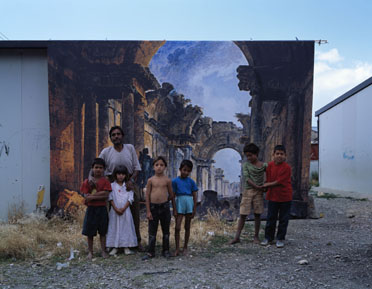Danica Dakić
Role-Taking, Role-Making
Opening reception: January 21, 2010, 7 p.m.
Exhibition duration: January 22 - May 16, 2010

"Role-Taking, Role-Making" is the title and leitmotiv of the Generali Foundation show devoted to Düsseldorf-based artist Danica Dakić (born 1962 in Sarajevo). The social and cultural shaping of roles, as well as the way roles are adopted and articulated, are central motifs in her art. In the media of video, film, and photography, the artist examines concepts including "culture," "home," and "tradition"—values which are subjected to dramatic change by war or migration, and whose traces become legible in history, language, and identity. These issues appear in a special light on account of Dakić's own experience of migration. In her work, the artist promotes sensitivity to processes associated with flight and exile, with alienation and cul-tural memory.
One of the questions she asks is: What is freedom? Can being uprooted also be seen as an opportunity and not merely as estrangement? What does it mean to lose one’s language and the ability to express oneself in new surroundings? Which roles are imposed on us?
Role-Taking, Role-Making (2004/2005) deals with role-related behavior between conforming and self-positioning with reference to forms of cultural representation and collective visual memory. The theme is the historical and political situation of the Roma in South-east Europe, their marginalization in Kosovo, but also the dubious nature of the "integration" of Roma in Germany. The work ex-amines roles attributed to Sinti and Roma in a united Europe and in the Kosovo of the post-Yugoslavian era, as well as the repre-sentation of "gypsies" in European cultural and art history. For Role-Taking, Role-Making, Dakić worked with inhabitants of the enclaves of Preoce and Plementina. In reenactments of stock portrayals of "gypsies" from art history, a range of narrative and representational strategies are interwoven with interviews and documentary se-quences from the real lives of the protagonists. An external point of view is provided by footage of rehearsals for a theater play—Federico García Lorca’s Blood Wedding—performed by the Pralipe company from Skopje which, as Europe’s only Roma theater group, worked from 1991 through 2004 at Mühlheims Theater an der Ruhr, where Dakić accompa-nied them and documented their work on film.
In Isola Bella (2007/2008), too, Dakić addresses the categories of role, identity, and personality. Against a backdrop of photographic wallpaper showing an paradisiacal island, the inhabitants of a home for the physically and mentally handicapped in the Bosnian town of Pazarić develop performances, tell stories from their lives, write texts, sings songs, and improvise on the piano. The work is concerned only in immediate terms with the history of this place and its inhabitants.
In reenactments of stock portrayals of "gypsies" from art history, a range of narrative and representational strategies are interwoven with interviews and documentary sequences from the real lives of the protagonists. An external point of view is provided by footage of rehearsals for a theater play—Federico García Lorca’s Blood Wedding—performed by the Pralipe company from Skopje which, as Europe’s only Roma theater group, worked from 1991 through 2004 at Mülheim’s Theater an der Ruhr, where Dakić accompanied them and documented their work on film.
The protagonists, detached by the setting from their social, legal, medical, and cultural profiles, take to the stage with their desires, dreams, and fantasies. As actors and audience, they perform and reinvent themselves at the same time. The masks they wear both on stage and in the audience, the wallpaper, and the cinematic styl-ization suspend the reality principle, as Tom Holert notes in his remarks in the publication accompanying the exhibition. They pro-tect, create distance, and enable the performers to present the “I as an other” for the duration of the play.
The themes and subjects of Dakić’s films and photographs make such distancing essential; any pushiness would compromise the integrity of those portrayed. With the help of strategies from theater, performance, and photography, the artist examines the stereotyping gaze while at the same time lending those portrayed the power to free themselves from precisely this kind of stereotyping. Theatricality is actively pursued, the pictorial content heightened—not as an objectified cliché, but with a fragmentariness (sometimes ironic), with all manner of contradictions that break open the illusionism of reenactment and turn the act of staging into the actual content of the picture.
Danica Dakić’s engagement with the language, identity, and history of marginalized people leads not to a faithful depiction of reality, but to its fictionalization via staging, articulating a critical discussion of received forms of representation and normative role attributions.
With “Danica Dakić. Role-Taking, Role-Making” Generali Foundation is hosting the first extensive solo exhibition by the artist in Austria. The show features key works including: Casa del Lago (2008/2009), Warm-Up (2008), Isola Bella (2007/2008), El Dorado. Giessbergstrasse (2006/2007), Role-Taking, Role-Making (2004/2005), Tauber Tanz (Deaf Dance, 2003), New York Diary (2001/2002) and Autoportrait (1999).
Curator: Sabine Folie
Assistant Curator: Georgia Holz
The exhibition is a collaborative project by the Kunsthalle Düsseldorf gGmbH with Generali Foundation, Vienna, and the Museum of Contemporary Art Zagreb